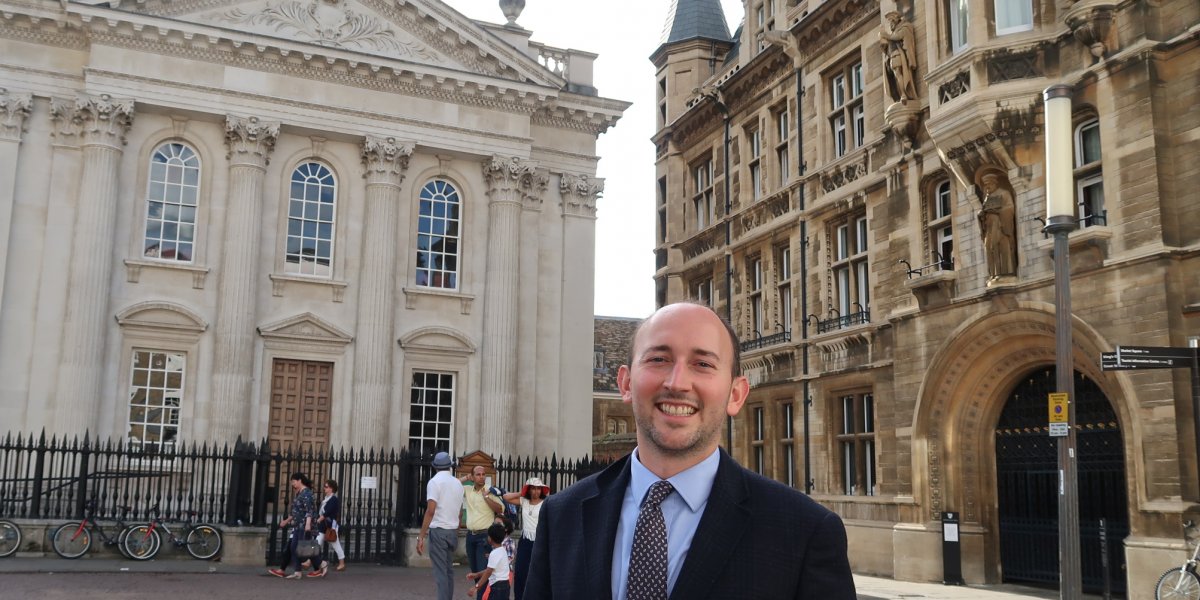Not all those who wander are lost - Sam Sudar
Sam Sudar (St John's 2011) explains that studying an eclectic combination of subjects helped him discover his true passion. Today he’s developing an app for a global health project.
Cambridge is a remarkable place, and I loved it there. It is a truly international university, and I was able to engage with people from all over the world.
Undergraduates in the US do not have to choose a focus until relatively late in their university career. In my case, I spent my first two years at the University of Washington as a classical guitar major, dabbling in classes on Latin and photography. It wasn’t until the start of my third year that I changed course. A typical undergraduate education in the US takes four years. It took me five, but I graduated with degrees in Philosophy, English, and Neurobiology.
From classical guitar to neurobiology
It was neurobiology that took me to Cambridge. Conditions of the nervous system - things like paralysis, ALS (Amyotrophic lateral sclerosis), multiple sclerosis - have always struck me as unique for medicine’s relative inability to combat them. As an undergraduate I’d worked in a lab studying retinal regeneration, and at Cambridge I read for an MPhil in Professor Robin Franklin’s lab in the Vet School studying myelin. Myelin is a sheath that covers neurons and it is critical to the function of the nervous system. Multiple sclerosis is a condition due largely to myelin damage.
Into the Cambridge bubble…
Cambridge is a remarkable place and I loved it there. It is a truly international University, and I was able to engage with people from all over the world. The College system provides a way to mix with a breadth of people that we don’t have an equal to in the US. In the US you are typically surrounded with people in your department or in your research area. At Cambridge, the College system put me in contact with a wide range of people. In an evening at John’s I could find biologists and talk about my research, or I could spend the evening talking with a philosopher of religion. With a diverse educational background like mine, this was a godsend, and something I have missed back in the US.
The University also gave me many chances to keep learning, even about things that were not strictly in my field. Through the School of Biological Sciences I began taking short introductory programming courses that helped me with the computational work I was doing for my MPhil. These gave me working knowledge of many fundamental techniques I had read about but never had an opportunity to learn. My research began to improve, and a new world opened up to me as I discovered I had a passion for computers as well as biology. Formerly perplexing subjects now made sense and I was programming in my spare time. When I was stuck or had questions, a drink in College would always turn up a CompSci (Computer Science) student that was happy to help.
Looking ahead and looking back
Using these courses as a foundation, after my MPhil I began a PhD program in computer science back in the USA, at the University of Washington. Although I started out in a lab using computers to study the brain, I began to gravitate toward a group in the department working on information and communication technology for development (ICTD). ICTD is a young field in computer science that tries to create technology that will benefit those in the developing world. I was drawn to the work due to the diverse group and the international scope that I’d come to appreciate in Cambridge. ICTD research is highly applied, and over the course of a few months you can build a tool and see it deployed in the field. Three years later, I’ve worked with researchers in Kenya, the Red Cross in Panama and Jamaica, and most recently with doctors in Peru.
Peru has a policy where cellular companies trying to establish themselves in the country must first provide coverage to rural areas. This means that, perhaps surprisingly, remote villages in the Amazon can frequently expect decent mobile service. In 2016 I accompanied a medical boat up the Amazon River to visit a number of these communities. Working with a global health project called Mamás del Río, I designed a mobile phone application that allows community health agents to report maternal health metrics from these communities. The project has recently received funding to scale up from 15 to 100 villages.
Although my path between fields has been somewhat unconventional, I can trace it clearly back to Cambridge. In Cambridge you are surrounded by history and the impact the University has had on the world. That history is full of people who left the world better than they found it and the people I met at Cambridge have similar goals. My experience there motivated me to embrace my intellectual curiosity and to try to do the same.
Sam has an MPhil in Neuroscience and a PhD in Computer Science and Engineering. He attended St John's College.
If you would like to submit your own alumni story, send us an email for details of our submission guidelines.
This article has been written by Sam Sudar and the opinions expressed are those of the author.

